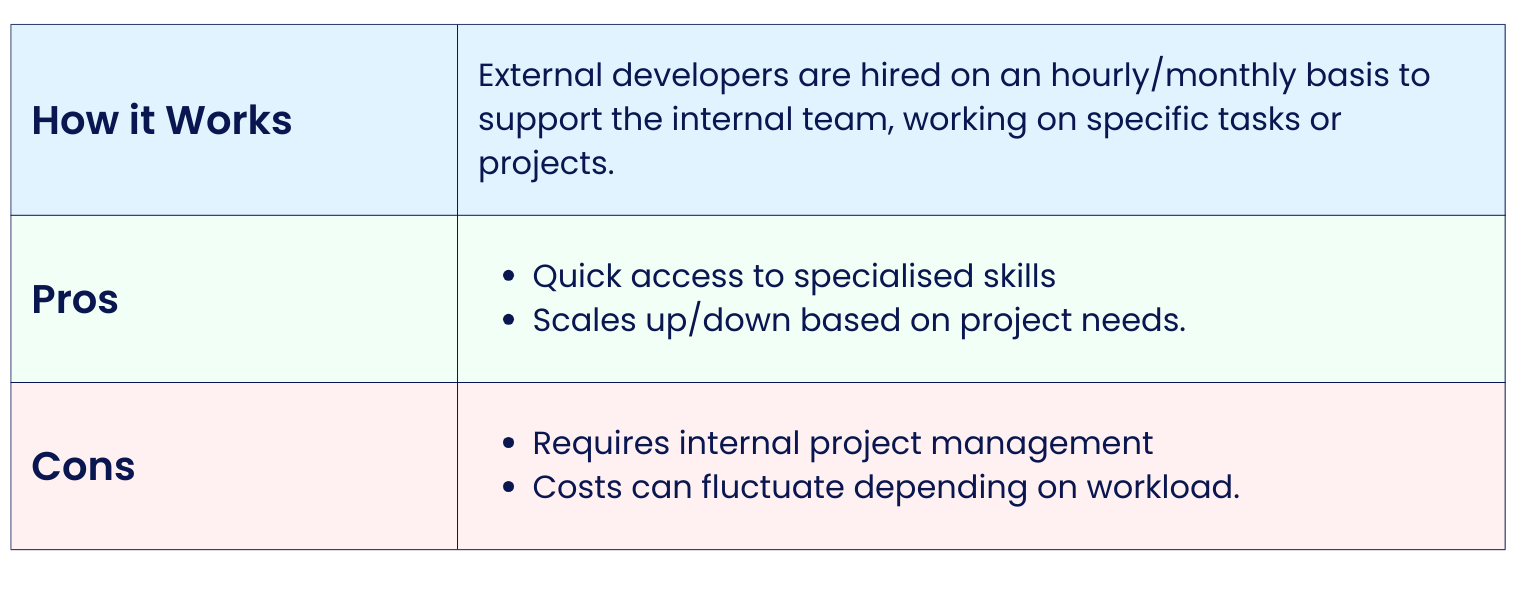Introduction
Softwares power nearly every aspect of your business, from managing customer relationships, tracking finances to collaborating with teams, automating workflows, and more.
When is it that you need a software development partner?
- You’re building a new business and need a mobile app, web platform, a SaaS solution, or an enterprise system
- You need to revamp the tech stack of your existing software, ensuring better performance, scalability, or security
- Your business is expanding, and off-the-shelf solutions no longer meet your unique needs
- You need custom integrations, automation, or AI-driven solutions
In this blog we’ll walk through how to prepare before starting your search, key factors to evaluate- like expertise, cost, security, and communication and how to ensure a successful partnership.
By the end, you’ll have a clear roadmap to choosing the right development team for your software development requirements..
What should your preparation be before selecting a software development partner?
Before you start looking for a software development partner, you need clarity on your own requirements. A well-defined approach helps in setting clear expectations, avoiding unnecessary costs, and ensuring the final product aligns with business goals.
Clear project scope
A software project needs a clear purpose. Whether it’s a new mobile app, a SaaS product, or a modernization of an existing system, defining the key objectives early on is essential.
Consider the following beforehand:
- Essential features and technology preferences.
- Scope of customizations and scalability expectations
- Integration requirements with existing systems and new integrations like payment gateways
Your budget estimates
Software development costs vary widely based on complexity, technology stack, and the expertise of the development team that you are going to hire.
Establishing a budget range helps in identifying partners that fit both technical and financial expectations.
It’s also important to factor in-
- The pricing model- fixed cost, hourly rates, or dedicated teams
- Additional costs like cloud hosting, third-party API integrations, compliance measures, etc
- scenario on ongoing maintenance and updates
Time frame
Timelines are crucial in software development. A well-planned timeframe ensures smooth execution without compromising on quality.
There could be a few key aspects to define-
Development milestones and testing phases
A target launch date
Flexibility in case of scope changes
Setting realistic expectations helps avoid rushed releases or prolonged delays in the software development.
Preferred engagement model
Every software development project follows a different structure based on its complexity, budget, and flexibility needs.
Selecting the right engagement model ensures a smoother working relationship with the development partner and prevents misalignment of expectations.
The most common engagement models include:
A. Fixed-price model– Best for well-defined projects with a clear scope and generally work better with projects with relatively shorter timelines

B. Dedicated Development Team- For businesses with long-term development needs, hiring a dedicated team ensures continuity and deep product understanding.
Unlike short-term staff augmentation, a dedicated team works exclusively on a company’s project for an extended period.

C. Flexible Scaling- For projects with evolving requirements or businesses needing to temporarily expand their development team, staff augmentation offers a flexible alternative.
Instead of hiring full-time employees, companies can bring in on-demand talent (developers, UI/UX designers, QA testers) for specific tasks.

Essential Factors to Consider When Choosing a Software Development Partner
Choosing the right software development partner today is more than just hiring a team of developers. It’s about finding a trusted technology partner who understands your business, aligns with your vision, and delivers high-quality, scalable solutions.
A Wrong choice can lead to delayed timelines, budget overruns, and take away your edge. Here are the key factors to consider for your software development vendor when making this critical decision:
1. Technical expertise and industry experience
A development partner should have deep technical expertise and hands-on experience in your industry. While strong coding skills are a given, understanding business-specific challenges, compliance requirements, and industry trends sets apart a great partner from an average one.
A partner with relevant industry experience can anticipate challenges and suggest better & faster solutions, ensure compliance with sector-specific regulations, and deliver software that aligns with market demands and user expectations
What to Look For:
- Experience working in your industry and handling similar use cases.
- A tech stack aligned with your project requirements
- Ability to design scalable architectures that support future growth
2. Portfolio and social proof
A company’s past work speaks volumes about its expertise, quality standards, and ability to deliver results. Reviewing their portfolio gives insight into technical capabilities, design approach, and problem-solving skills.
Beyond a portfolio, client reviews and testimonials offer real-world validation of their reliability. Look for consistent feedback on communication, deadlines, and post-launch support.
What to check for:
- Case studies showcasing their problem-solving approach and business impact.
- Reviews on independent platforms like Clutch, GoodFirms, Google Reviews, etc.
- Client references who can provide firsthand feedback on their experience.
3. Communication and organization’s culture
Strong communication and cultural alignment determine the success of a partnership. Even the most skilled development team can fail if expectations, timelines, or workflows are not properly communicated.
Good communication means transparency, clarity, and proactive problem solving. It also ensures seamless collaboration, especially in remote or outsourced development partnerships.
What to Look For:
A structured reporting process with regular updates and progress tracking.
Flexibility in adapting to different time zones and working styles.
4. Flexibility in engagement
Software projects often evolve- business needs change, new features become necessary, and timelines shift.
A good development partner should offer flexibility in how projects are structured, resources are allocated, and teams are scaled.
A flexible partner can adapt to changing priorities without derailing progress, scale resources up or down based on project phases, and offer different engagement models suited to varying budgets and requirements.
What to Consider:
- The availability of multiple engagement models (Fixed-Price, Time & Material, Dedicated Team)
- The ability to quickly onboard or ramp down resources as needed.
- Clarity in contractual terms for changes or additional requirements
5. Cost vs value
While budget is an important factor, selecting a software development partner should not be a race to the lowest price. The cheapest option often leads to poor quality, technical debt, or hidden costs in the long run.
Instead of focusing solely on upfront costs, it’s essential to assess the overall value a partner brings—quality of work, scalability, long-term maintenance, and return on investment (ROI).
A good development partner ensures that the project is cost-efficient without compromising on performance, security, or future growth.
What to Consider:
- Transparent Pricing: Ensure the partner provides a clear breakdown of costs with no hidden fees.
- Total Cost of Ownership: Factor in ongoing maintenance, scalability, and upgrades beyond initial development.
- Cost-Quality Balance: Assess whether their pricing aligns with the level of expertise, security, and performance offered.
- ROI-Focused Approach: Evaluate whether the software will deliver long-term business benefits, not just immediate functionality.
6. Security and compliance
Security and compliance should be integral to software development, not an afterthought. A development partner must follow secure coding practices, data protection protocols, and industry regulations to prevent breaches and ensure regulatory compliance.
Failure to prioritize security can result in legal liabilities, reputational damage, and financial losses.
What to Consider:
Compliance Standards: Ensure they adhere to industry regulations such as GDPR, PCI-DSS, ISO 27001, depending on your business domain.
Secure Development Practices: Look for encryption methods, secure authentication, penetration testing, and data protection mechanisms.
Risk Mitigation Strategies: Assess whether they offer disaster recovery plans, automated security updates, and ongoing monitoring.
7. Post launch support
A software project doesn’t end at deployment- it requires continuous monitoring, bug fixes, security updates, and performance optimizations.
A reliable development partner provides ongoing technical support, troubleshooting, and enhancements to ensure long-term success.
What to Consider:
- Service Level Agreements: Ensure they offer defined response times, maintenance scope, and update cycles.
- Bug Fixes & Security Patches: Regular updates should address vulnerabilities and improve system performance.
- Scaling & Future Enhancements: The partner should be available for ongoing development, whether for adding new features or optimizing existing ones.
Finding a tech partner in the UAE? Here’s what you need to know
If you are looking to find a reliable partner in UAE for software development. Remember it isn’t just about great code, it’s about choosing a partner who understands the region’s regulations, languages, and business culture.
Here’s what to look for when selecting a development partner in the UAE:
- Regulatory Compliance – If you’re in finance, healthcare, or eCommerce, your app must comply with data protection, fintech & health regulations.
- Industry & Tech Expertise – Your partner should blend global tech expertise with regional know-how, so your software works for every user.
- Overall Language Support – Solutions should not only work seamlessly in both languages with Arabic support where needed for a smooth user experience.
- Local Cloud & Hosting Solutions – Many businesses prefer local cloud providers like AWS Middle East, etc for compliance and performance.
- Smooth Collaboration & Communication – A UAE-based or regionally experienced team means better communication, faster turnarounds, and a smoother project flow.
Conclusion
Choosing the right software development partner is about more than technical skills, it’s about finding a team that aligns with your business goals, work culture, and long-term vision. Beyond expertise, factors like communication, flexibility, security, and post-launch support play a key role in ensuring a smooth collaboration.
With remote teams and global partnerships becoming the norm, evaluating a vendor’s responsiveness and adaptability is just as important as assessing their technical capabilities. The wrong choice can lead to delays and inefficiencies, while the right partner drives scalability and long-term success.
By focusing on the right selection criteria, businesses can make an informed decision and build software that delivers lasting value.
Looking for a reliable software development partner?

 Dista
Dista




